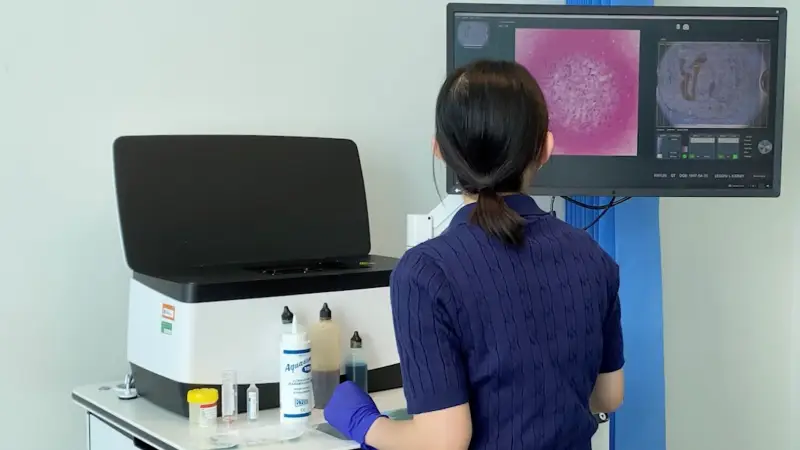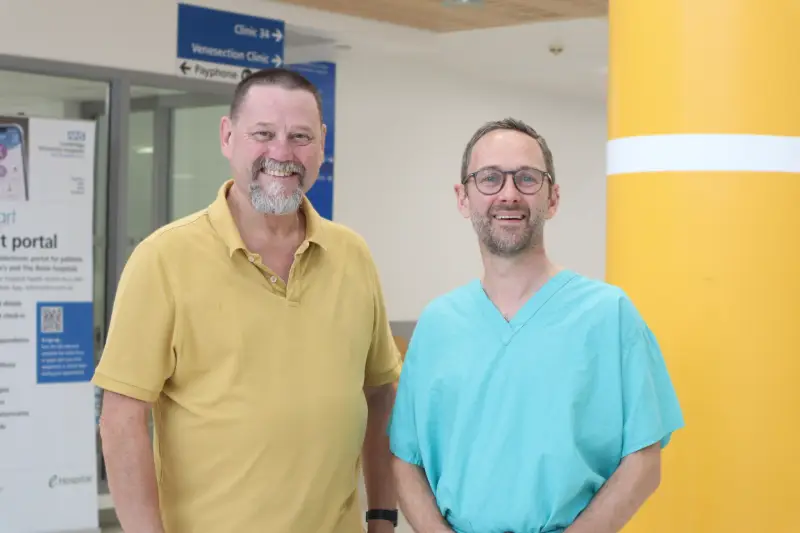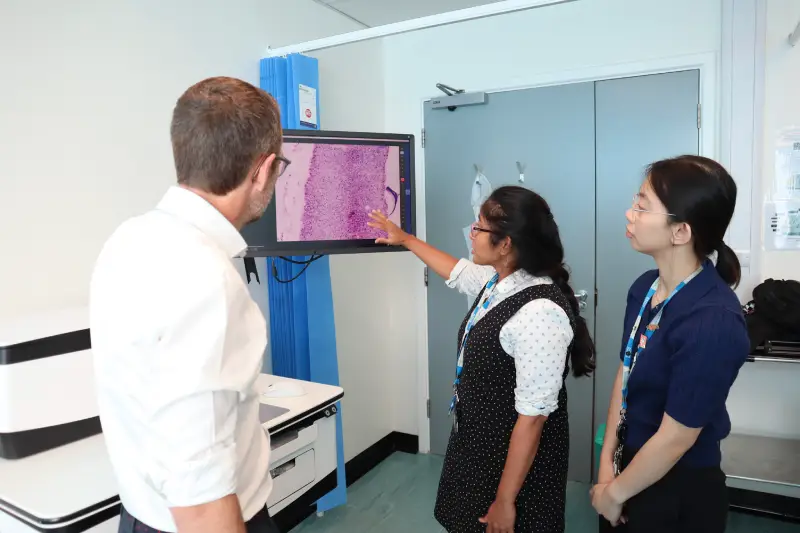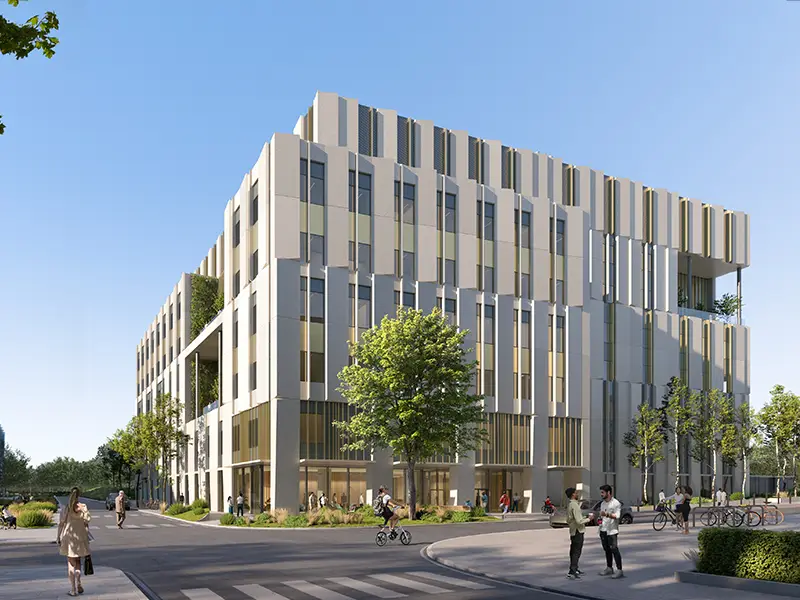In a UK first, a one-stop kidney cancer clinic at Addenbrooke’s Hospital is pioneering an ultra-fast way of diagnosing cancer, which is cutting waiting times for patients by a month.
A team of urologists, radiologists, pathologists and specialist nurses at Cambridge University Hospitals NHS Foundation Trust (CUH) are using a confocal microscope to diagnose biopsy samples in the clinic within minutes – reducing anxiety, cutting the number of hospital visits and allowing patients to begin treatment sooner.
Professor Grant Stewart explains the one-stop cancer clinic
Link: https://youtu.be/_QXFuVpclW0
The fact that I could have a biopsy, receive a diagnosis and talk through treatment options with my doctor there and then, all on the same day, made such a difference.
Ken Pottle, patient
A biopsy is often needed to determine if a lump or mass on the kidney is malignant. However, standard pathology analysis takes time to process, leaving patients potentially waiting weeks for cancer to be confirmed or ruled out.
At the one-stop clinic, patients with suspected kidney cancer can have a biopsy, receive a diagnosis and discuss treatment options – all on the same day.
The £250,000 confocal microscope, which was funded by Addenbrooke’s Charitable Trust (ACT) and the University of Cambridge, looks much like an office printer or scanner.

More often used in dermatology, the microscope provides high resolution images of tissue samples so once a sample is stained and scanned by the confocal microscope, pathologists at the kidney clinic can make an immediate diagnosis.
For the first time in the UK, we are using a confocal microscope in this innovative way to benefit patients. Offering same day diagnosis helps reduce anxiety, cuts down on hospital appointments and means patients can have that all-important discussion with their doctor about treatment options significantly sooner.
Professor Grant Stewart, consultant urologist at Addenbrooke’s Hospital and Professor of Surgical Oncology at the University of Cambridge

Ken Pottle, 63, visited the one-stop clinic in March after a scan for an unrelated condition showed a lump on his kidney. Following a biopsy and diagnosis of cancer, the semi-retired civil servant from Bury St Edmunds opted for thermal ablation, a treatment that uses heat to destroy tumours. Following treatment in April, he was given the all-clear a couple of weeks ago. Mr Pottle says he would not hesitate to recommend the kidney clinic.
Mr Pottle said: “I’m a very pragmatic person, so knowing I had a treatment plan in place helped me process my cancer diagnosis. Waiting to find out if you have cancer can be incredibly worrying. When I heard about the one-stop kidney clinic, I thought “wow, what a fantastic idea.” The fact that I could have a biopsy, receive a diagnosis and talk through treatment options with my doctor there and then, all on the same day, made such a difference."

Mr Pottle, who has five children and two grandchildren added:
Five months on from my treatment, I’ve now been given the all-clear. I’m back at work and enjoying life, spending time with my children and grandchildren, and getting back on my motorbike. The whole process has been brilliant.
In research published today in European Urology Oncology, cancer waiting times for patients at the kidney clinic were more than halved, cutting average waiting times by a month.
Patients on the typical multi-appointment pathway waited 55 days between first being referred and a decision being made about treatment, while patients at the one-stop kidney clinic waited just 25 days.
Researchers compared the confocal microscope results with standard pathology tests and found the diagnoses made using the confocal microscope were both accurate and reliable. There was a 91.7% match between the diagnoses made using the confocal microscope and final pathology. In the other 8.3% of cases, the diagnoses agreed but the cancer subtype was uncertain.
Crucially, out of 48 patients evaluated in the study, none of the treatment plans made on the day at the one-stop clinic needed to be changed after their formal biopsy pathology analysis was completed.
While the confocal microscope is not intended to replace standard pathology tests – as they provide additional details like the cancer grade – the accuracy of the diagnoses made using the confocal microscope means clinicians can confidently discuss results and treatment options with patients much earlier.

Another advantage of the clinic, which is known as CkOSMIC (Cambridge kidney One-Stop Mass Investigation Clinic), is pathologists can instantly assess if a biopsy has been successful, if there is enough tissue to make a diagnosis, or if a second one is required. Four patients in the study were identified as needing a repeat biopsy which took place on the same day, without needing to wait and return to hospital at a later date for another appointment.
There was positive feedback from patients in the study, with 96% surveyed saying they had enough time to ask questions and consider treatment options on the day. Clinicians also supported offering a same-day diagnosis and would like to see it used more widely with 100% of urologists and pathologists agreeing the approach is suitable for initial diagnosis and treatment planning.
Prof Stewart, who is national lead for the Getting It Right First Time ideal pathway for kidney cancer and clinical director of the National Kidney Cancer Audit, helped develop new kidney cancer guidelines for NICE which recommend that more patients with suspected cancer should have a biopsy to confirm their diagnosis sooner, to treat their disease more effectively.
Prof Stewart hopes the one-stop kidney clinic approach could become standard care for renal tumour biopsies. There is also the potential for the approach to be applied to other cancers in the future.

The kidney clinic was influenced by work underway on service improvement and transformation as part of the development plans for Cambridge Cancer Research Hospital. The planned hospital will bring together clinical excellence and world-leading research under one roof, accelerating new innovations to help detect cancer earlier, meaning better outcomes for patients.
I hope everyone reading this story and who has kindly donated to Addenbrooke's Charitable Trust feels justly proud of the extraordinary impact this project is having, because this life saving project has been made possible because of them. This incredible piece of equipment, and the clinic that Grant has set up, is the perfect example of why ACT is here, to work with amazing clinicians and make possible their ideas that change and save lives.
Shelly Thake, Chief Executive of Addenbrooke’s Charitable Trust (ACT)

